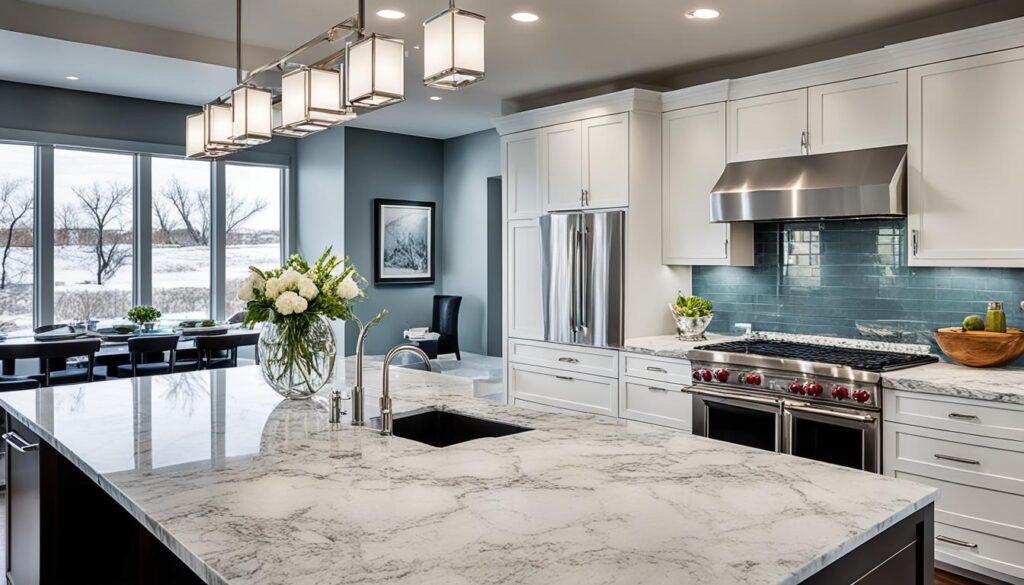Table of Contents
Many homeowners wonder, “Do marble countertops stain easily?” This question is at the forefront of their minds when they consider the beauty and elegance that marble can bring to a kitchen or bathroom. The concern about stains is valid, given marble’s reputation for being somewhat high maintenance compared to other countertop materials.
We’ve been there too, worried about choosing marble for our projects due to fears of staining. But through extensive research, we discovered some eye-opening facts. For instance, did you know that marble’s porosity plays a crucial role in its tendency to stain? Armed with this knowledge and more, we aim to dispel myths and shed light on how you can maintain the timeless appeal of your marble countertops without constant worry. Our guide will detail practical steps towards preventing stains and ensuring your counters stay as immaculate as they were on day one. Stay tuned for surprising insights!
Key Takeaways
- Marble countertops can stain because they are porous. This means liquids can seep in and leave marks.
- There are two finishes for marble: honed and polished. Honed marble is less shiny but may stain easier. Polished marble resists stains better but can show scratches.
- To keep marble from staining, clean spills quickly, use coasters, and apply a good sealer regularly.
- Avoid using harsh cleaners on marble as they can damage the surface. Use mild soap instead.
- Sealing your marble countertops helps create a barrier against stains, making them last longer and look better.
Explanation of the topic
We often hear that marble countertops stain easily. This worries many of us who love their beauty in kitchens. The truth is, understanding how this natural stone reacts with spills, seals, and cleans can make a big difference.
Marble is indeed more porous than granite. This means it can absorb liquids faster, which might lead to stains if not treated properly.
To keep our marble looking great, we need to know about sealing and cleaning it the right way. Sealing marble countertops helps prevent stains by filling the pores in the stone. Proper maintenance includes wiping spills quickly and using the right cleaners.
So yes, marble can stain but with good care, we can prevent these issues and enjoy its timeless elegance for years.
The common misconception about marble countertops
Many homeowners and business owners think marble countertops stain easily. This idea may come from the porous nature of marble. It can absorb liquids, leading to stains. People worry about spills like wine or juice leaving marks.
They often believe that once stained, these countertops are ruined.
In reality, marble is not doomed to be a mess with proper care. Polished and honed finishes affect staining in different ways. With the right maintenance, we can prevent stains on our marble surfaces.
Regular cleaning and sealing help protect against spills too!
The Differences Between Honed and Polished Marble
Honed marble has a matte finish, while polished marble shines brightly. These finishes change how each type reacts to stains and scratches. Polished surfaces are less porous than honed ones, making them tougher against spills.
For more details on these differences, check online guides or consult experts from Rock Solid Tops for advice tailored to your needs. Taking action now will lead us closer to achieving our dream spaces with stunning surfaces.
Definition of honed and polished marble
Honed and polished marble are two different finishes. Honed marble has a matte look. It feels softer to the touch. This finish makes it less slippery and better for avoiding stains.
Polished marble shines brightly. It has a smooth surface that looks elegant. However, this glossy finish can show water spots easily.
The choice between honed vs polished marble affects how we care for it. Honed surfaces tend to hide scratches better but may absorb liquids more quickly, leading to staining with water or other substances.
Polished surfaces resist some stains but can etch when exposed to acidic items like lemon juice or vinegar. Understanding these differences helps us maintain our countertops effectively and prevents staining on marble surfaces.
How they affect staining and etching
Honed marble has a matte finish. This type is less shiny and more porous. It can absorb liquids quickly, which increases the chance of staining. Polished marble, on the other hand, has a glossy surface.
This makes it less prone to stains but can still etch if we spill acidic things like lemon juice or vinegar.
Both finishes can show marks over time. We need to be careful with both types of marble countertops. Knowing how honed and polished surfaces work helps us maintain their beauty better.
Choosing the right finish also plays a big role in preventing stains on marble countertops.

The Porous Nature of Marble
Marble is a porous stone, which means it can soak up liquids easily. This makes it more likely to stain. When spills happen, the liquid seeps into the marble and causes marks. Keeping your marble clean is key to preventing stains.
To learn how to care for your marble countertops, read on!
Why marble is prone to staining
Marble is a porous stone. This means it can absorb liquids. Water, wine, or juice can seep into the marble. Once these liquids enter, they can cause stains. Staining on marble countertops happens easily if we do not take care of them.
We need to be aware that certain foods and drinks can leave marks. These stains may become permanent without prompt cleaning. Proper maintenance is key in preserving our marble surfaces.
By sealing the countertops regularly, we help stop liquid from seeping in and causing damage.
How liquids seep into the marble
Liquids seep into marble easily. This is due to marble’s porous nature. It has tiny holes that allow liquids to enter. When we spill something like coffee or wine, it can quickly soak in.
Once the liquid goes in, it can leave a stain behind.
We must act fast when spills happen. Wiping up any mess right away helps prevent staining and etching on marble countertops. If we let the liquid sit, it might stay forever. Keeping our marble sealed also helps stop stains from forming by creating a barrier against liquids seeping in.
Maintaining and Preventing Stains on Marble Countertops
To keep marble countertops looking great, we should clean spills right away and use a good sealer. This helps protect the surface from stains. To learn more tips on caring for your marble, read further!
Tips for cleaning and sealing marble
Cleaning and sealing marble countertops is essential for keeping them beautiful. We can prevent stains with the right methods. Here are some tips to help us maintain our marble:
- Use a gentle cleaner. Acidic cleaners can harm marble. Stick to pH-balanced products or mild soap mixed with water.
- Clean spills right away. Liquids like wine or juice can seep into marble quickly, causing stains. Wipe up any messes as soon as possible.
- Apply a sealer regularly. A good marble sealer helps protect our countertops from staining. Check the label for how often to reapply it.
- Avoid harsh scrubbers. Using steel wool or rough sponges can scratch the surface of our counters. Soft cloths or sponges work best for cleaning.
- Rinse thoroughly after cleaning. Residue from soap can attract dirt and make surfaces dull over time. Always rinse off any cleaners with clean water.
- Use coasters and mats under hot dishes and drinks. These items help protect the surface from heat and moisture, preventing potential damage or staining.
- Test new products in a small area first. Before using any new cleaner or sealant, we should check it on an inconspicuous spot first to avoid damage.
These steps will help us keep our marble countertops looking great while reducing the risk of stains and other issues that come with time.
How to prevent stains
We want to keep our marble countertops looking great. Stains can happen, but we can take steps to prevent them.
- Use coasters for drinks. They stop liquids from spilling directly on the marble. This helps avoid stains from water or other beverages.
- Clean spills right away. Wipe up any liquid quickly before it seeps into the marble. This quick action makes a big difference.
- Apply a good sealer. Sealing our marble countertops creates a barrier against stains. We should look for the best marble sealer that lasts longer.
- Avoid acidic foods and drinks on the counter. Items like lemon juice or vinegar can etch the surface and cause stains. Keeping these away helps protect our countertops.
- Use cutting boards and mats while cooking. These tools prevent scratches and stops liquids from getting onto the marble’s surface.
- Regularly clean with mild soap and water. Harsh chemicals can damage the finish of our countertops, making them more prone to staining.
- Reseal every year or as needed based on usage. Frequent sealing keeps our countertops protected from stains over time.
Taking these steps helps us maintain beautiful marble countertops for years to come!
Conclusion
Marble countertops can stain, but with proper care, we can enjoy their beauty. Take steps to protect and maintain them. If you want to learn more about marble countertops, keep reading!
The truth about marble countertops
Marble countertops have a reputation for staining easily. Many people think that all types of marble stain the same way. This is not true. Honed and polished marble act differently when it comes to stains and etching.
Polished marble has a shiny surface, but it can still absorb liquids. On the other hand, honed marble has a matte finish and may soak up spills more quickly.
The porous nature of marble makes it prone to staining. Liquids can seep into the stone if we do not clean them up right away. Water can cause marks just like other drinks can. To keep our countertops looking nice, we should take care of them properly.
By cleaning regularly and sealing our marble, we can help prevent stains from setting in for good.
Final thoughts and recommendations
We know the truth about marble countertops. They can stain easily if not cared for properly. Choosing between honed and polished marble affects how they react to spills. Both types need our attention to stay beautiful.
To maintain marble countertops, we must clean them often. Use a gentle cleaner designed for marble. Sealing the surface helps prevent stains from liquids seeping into the stone. With proper care, we can enjoy our stunning surfaces without worry about staining or damage.
If you need more tips or resources, don’t hesitate to look around or ask experts from Rock Solid Tops for help.

FAQs
Do marble countertops stain easily?
Yes, marble countertops can stain easily as liquids can seep into the surface if not sealed properly.
What’s the difference between polished and honed marble when it comes to staining?
Polished marble has a shiny finish that helps repel stains while honed marble is more porous and prone to staining.
How can I prevent my marble countertops from staining?
To prevent stains on your marble countertops, you should seal them regularly and clean up any spills immediately.
Can granite also get stained like marble countertops do?
Yes, just like with unsealed or poorly maintained marble, granite too can absorb liquids leading to potential stains.
Is there a way to remove existing stains from my Marble Countertops?
Yes! You may be able to remove some types of stains using specific cleaning solutions designed for use on Marble Countertops.

